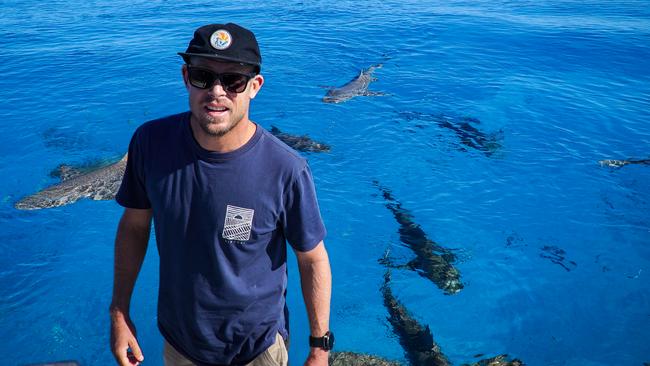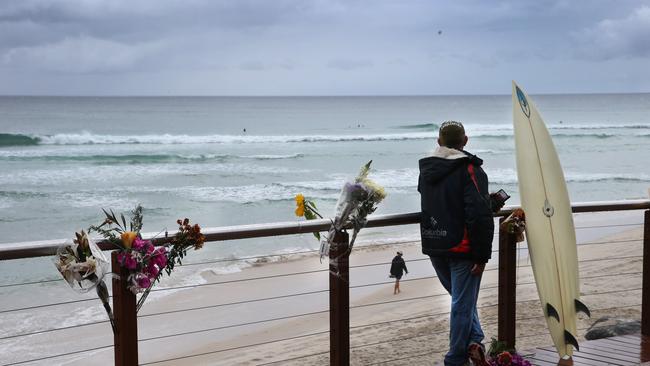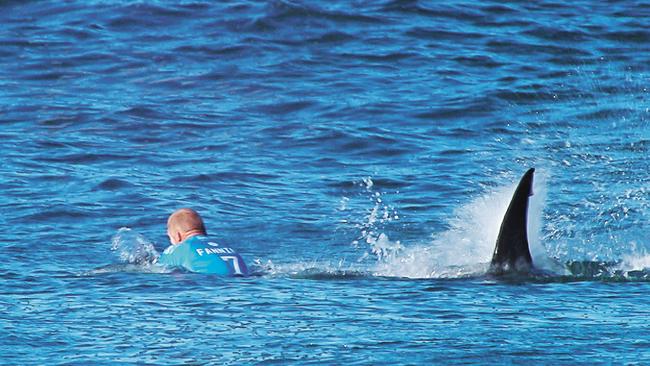Save This Shark: Mick Fanning says nets don’t work
Having paddled out at the popular Gold Coast beach the morning of Nick Slater’s fatal shark attack, and with another close encounter of his own, a rattled Mick Fanning reveals why shark nets aren’t enough.
QLD News
Don't miss out on the headlines from QLD News. Followed categories will be added to My News.
Champion surfer and shark attack survivor Mick Fanning has called for an overhaul of the Gold Coast’s “outdated” shark net program, revealing his shock over the fatal mauling of Nick Slater at a popular beach he surfed hours earlier.
The three-time world champion paddled out at his regular spot at Snapper Rocks, further out from the netted Greenmount Beach, on the morning of Tuesday’s “horrific” attack on Mr Slater, which he said had “rattled” the local surfing community.
Gold Coast shark attack victim mourned
Flawed: 2km of nets to protect 60km of beach
“I surfed Snapper that morning. I was actually about to just run out the front of my house as a friend rang me to tell me the news. It was just something that you wouldn’t expect along those points,” Fanning told The Courier-Mail.

“We didn’t think that it would happen so close and just the footage of it, it’s horrific. Everyone is shaken up and our hearts go out to the Slater family and all his friends, it’s just shocking.
“To be honest I think we surf these spots and we sort of feel almost invincible. We’ve got the drumlines and the shark nets there we almost feel a little bit safer but as we’ve seen you’re not fully protected.
“It is a huge eye opener but extremely, extremely sad.”
Fanning said he reached out to a friend who was in the water at the time of the attack to check on him, drawing on his own experience in the wake of his encounter with a great white shark in South Africa, which was broadcast live around the world in 2015.
“It’s only extremely fresh and everyone is still in shock,” he said.
“It’s one of those things where it can come and hit you at a later date, just seeing it first hand. You have to keep an eye on your emotions and make sure you do give yourself time to heal.”
“It’s still a little eerie out there. There’s not too many people in the line up.”

In response to the spate of attacks in the northern NSW region over the last five years, Fanning recently travelled around Australia, the US and the Bahamas to learn about shark conservation and tracking technology for his two-part documentary Save This Shark, which is set to air on National Geographic on Tuesday.
Aerial surveillance recommended, trial yet to happen
While the shark net program had protected Queenslanders for 60 years, he said there were now more effective programs available, including aerial surveillance and smart buoys, that should be implemented in Queensland.
“The shark nets, they go for 200 metres so it’s pretty easy for (sharks) to swim around or swim under them,” Fanning said.
“It’s just a little bit outdated. We haven’t revisited them for a long time. We see south of the border they have the smart buoys and tagged sharks get pinged and we can see where those sharks are via an app and I don’t see why we shouldn’t have that on the Gold Coast.”
“The beach is a huge part of our tourism and a huge part of our economy so I think it’s time we revisit that and see if there is a smarter, safer way of doing things.”
“You go down to Lennox (Heads) and they’ve got drones up, skis patrolling … we put so much money into scientists to come up with these new programs, so let’s speak to those guys and figure out the best plan.”

Fanning rejected calls to cull great white sharks in the region, describing it as “stupid” and a “kneejerk reaction” based on fear.
“We have to learn why it’s happening. Why are we seeing so much more activity along here? That’s what we need to find out rather than just going and slaughtering the ocean,” he said.
In Save This Shark, Fanning confronts his own fear of being in the water with a shark by going cage diving with great whites and free diving with both tiger and hammerhead sharks.
He hoped it would start a conversation in Australia about the best ways to deal with shark populations.
“How important they are to the ecosystem and how important they are to keeping the world clean and safe, that was something that I totally didn’t know,” he said.
“It might answer some questions but also it might start up a great debate and put us on a better path on how to protect sharks and make sure we’re doing the right thing by them.”

